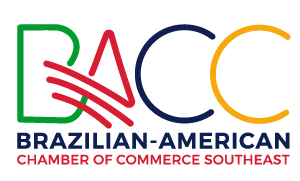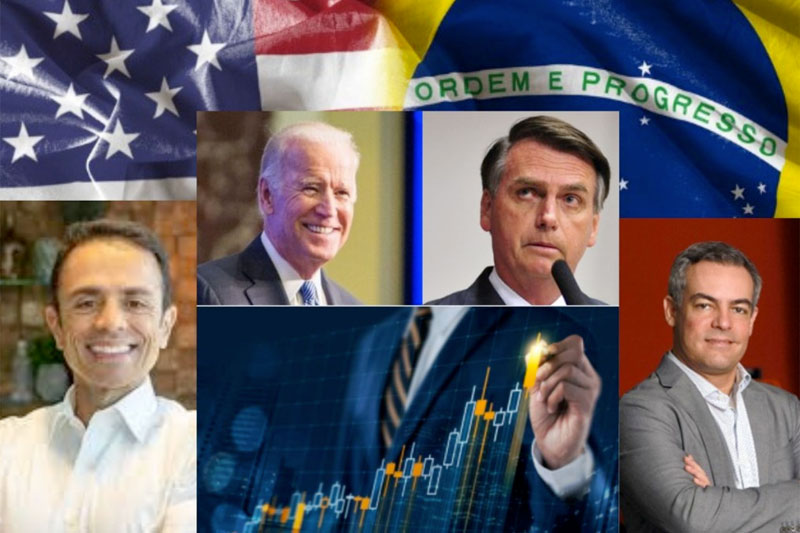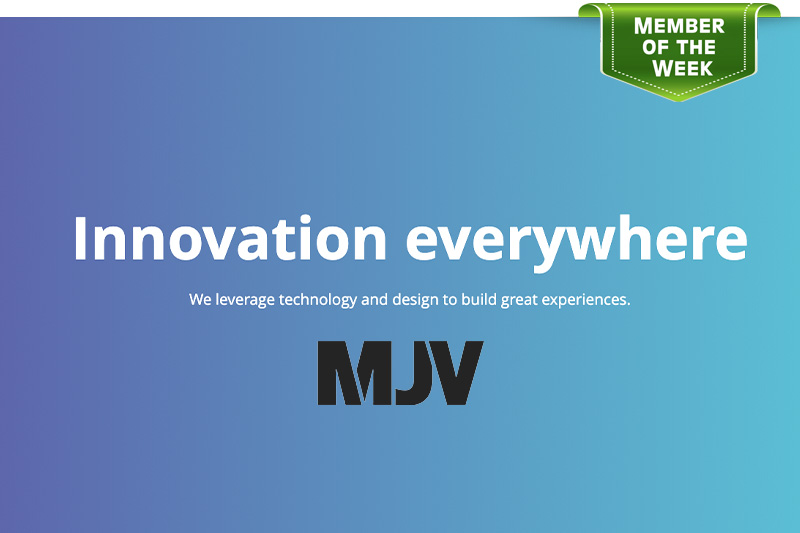
Carnegie Brasil, bringing innovation to English Learning in Brazil
October 20, 2020
Visita do embaixador brasileiro nestor foster em Atlanta
December 10, 2021Brazilian President Jair Bolsonaro sent newly sworn-in U.S. President Joe Biden a warm three-page welcome letter on January 20, asking for dialogue on common interests. Many were surprised to see this letter, given the strong support for former President Trump, as well as heated public discussions between then-candidate Biden and the Brazilian leader on issues dealing with U.S. aid for the preservation of the Brazilian rainforest. The letter addressed joint interests, including free trade, technology, international legal reform, cooperation to bring about the end of the COVID pandemic, etc.
Just before the US. presidency's turnover to Biden and the Georgia Senate runoff, in which Democrats Jon Ossoff and Raphael Warnock prevailed, Marcelo Bernal, Co-founder and CEO of Carnegie Brazil interviewed Rodrigo Dantas, EY's Lead Partner for the Americas for Payments Systems. They talked about the change of government, COVID, and how both may affect the FinTech industry, corporate relations and mutual economic prospects between the countries in the coming years. Both are members of the Brazilian American Chamber of Commerce of the Southeast (BACC-SE).
Speaking about the impact of the elections on the FinTech industry, Dantas said, “…the greatness of the countries themselves, both the U.S. and Brazil are greater than their rulers and always will be. There is no specific set of circumstances that in the short term is capable of harming our long-standing relationship which still has much to be explored."
Dantas continued: "The financial market is seeing the change of government in the U.S. in a positive way. Even with the predominance of a Democratic agenda, which is traditionally seen as less "pro-market", the positive view is justified by an expectation of greater predictability and consistency in government actions. The market is eager for predictability."
According to Entrepreneur Magazine, there are five trends for FinTech expected for 2021 that have been accelerated by the pandemic:
- Autonomous Finance – making use of artificial intelligence to free consumers from the burden of recurring tasks.
- Open Banking – seeing financial institutions as places to deposit funds instead of traditional banks, opening up easier investment opportunities.
- Digital-only banks - eliminating the need for face-to-face transactions.
- Financial Literacy – FinTech tools are democratizing investment options for consumers.
- Voice technologies – which may even include biometric data for payment authorization, adding another layer of security.
"The FinTechs are shaking up the classic banking world"; according to Dantas; "So-called online banks are experiencing high growth. Customers are increasingly doing financial transactions via smartphone and do not need agencies. The pandemic undoubtedly accelerated this trend. There was a migration from the physical purchasing modality to the virtual purchase, forming a new habit of consumption that is more convenient. The expectation was that this acceleration of development in this modality in the sector would happen in 2023, but it is happening in 2021 and will continue."
FinTech's competition with traditional banks has been going on for some time, but there is so much innovation in the field that there is now starting to be a stir within the FinTech industry itself. According to HLB, a global consulting and accounting network: "Barriers have diminished as technology has flourished, forcing financial institutions to change their methods or be left behind. It has opened the door to new startups, such as Monzo, in the banking sector, which target consumers with different needs and behaviors."
About this, Bernal asks, "What do you see as the major changes that can happen post-pandemic in relation to the FinTech market?"
According to Dantas, we will have a brutal transformation among companies in the payment sector, as there is a need for more efficient and flexible payment mechanisms. "In the business world, especially in small and medium-sized enterprises, it is very clear that there is a need to have flexibility in managing cash flow. We currently have a set of FinTechs that are more specialized and can provide these services."
Brazil is a world leader in the FinTech industry, and Atlanta is one of the centers of this business in the USA, including the American headquarters of several Brazilian FinTech companies. The pandemic has accelerated the importance of this industry and should help further globalize commercial opportunities. For Brazilian companies that wish to start or expand their business opportunities here, Bernal and Dantas point to two considerations:
- The exchange rate issue does not favor Brazil so much in relation to investments in the USA but favors sales of products and services in the USA. "Although the exchange rate is not expected to decrease in the short term, it is possible to make a plan that allows wise investments because the American market is large and disjointed, very competitive and with many opportunities, even for entrepreneurs who have a compliance structure based in Brazil, whether a service or a product," says Dantas.
- Learn to speak English. Whether you do sales and distribution through third parties or directly, to be productive and effective, you must speak the local language. At the end of the interview, Dantas concluded by saying, "Participating in the BACC-SE Chamber of Commerce is a great way for the entrepreneur to understand how to succeed in expanding in the American market. There are many opportunities in the United States, but it is a serious, complex environment and needs to be respected, here there is no so-called 'Brazilian way.'
Qual o impacto das eleições americanas e da Covid-19 no mercado das Fintechs e nas relações comerciais entre o Brasil e os EUA?
O presidente brasileiro Jair Bolsonaro enviou ao recém-empossado presidente americano Joe Biden uma calorosa carta de 3 páginas de boas-vindas em 20 de janeiro, pedindo diálogo sobre interesses comuns. Muitos ficaram surpresos ao ver esta carta, dada o forte apoio ao ex-presidente Trump, bem como a discussão pública e as discussões calorosas entre o então candidato Biden e o líder brasileiro sobre assuntos que tratam da ajuda americana para a preservação da floresta tropical brasileira. A carta abordou interesses conjuntos, incluindo o livre comércio; tecnologia; reforma legal internacional; Cooperação para trazer o fim da pandemia COVID; etc.
Um pouco antes da rotatividade da presidência americana para Biden e do segundo turno do Senado da Geórgia, no qual prevaleceram os democratas Jon Ossoff e Raphael Warnock, Marcelo Bernal, Co-fundador e CEO da Carnegie Brasil entrevistou Rodrigo Dantas, Sócio Líder da EY para a Área de Meios de Pagamentos nas Américas (Americas Payments Leader) sobre a mudança de governo, COVID, e como ambos podem afetar a indústria FinTech, as relações corporativas e as perspectivas econômicas mútuas entre os países nos próximos anos. Ambos são membros da Câmara de Comércio Brasil-Americana do Sudeste dos EUA (BACC-SE).
Falando sobre o impacto das eleições na indústria financeira da FinTech, Dantas citou: ...“a grandeza dos países em si, tanto EUA quanto o Brasil são maiores do que os seus governantes e sempre serão. Não há conjuntura específica que seja capaz de destruir de maneira brutal a curto prazo, uma relação a longo prazo com muito a ser explorada.”
Dantas continua: “O mercado financeiro está vendo a mudança de governo nos EUA de forma positiva. Mesmo com a predominância de uma pauta Democrata, que tradicionalmente é vista como menos “pro-mercado”, a visão positiva se justifica por uma expectativa de maior previsibilidade e consistência nas ações do governo. O mercado está ansioso por previsibilidade.”
De acordo com a Entrepreneur Magazine, há cinco tendências na FinTech previstas para 2021 que foram aceleradas pela pandemia:
- Finanças Autônomas – fazendo uso de inteligência artificial para que os consumidores se libertem do ônus das tarefas recorrentes;
- Open Banking – vendo as instituições financeiras como depósitos para fundos em vez de bancos tradicionais, abrindo oportunidades de investimento mais fáceis;
- Bancos somente digitais - eliminando a necessidade de transações presenciais;
- Alfabetização Financeira – As ferramentas FinTech estão democratizando as opções de investimento para consumidores;
- Tecnologias de voz – que podem até incluir dados biométricos para autorização de pagamento, adicionando outra camada de segurança.
"As FinTechs estão agitando o mundo bancário clássico”; segundo Dantas; “os chamados bancos online estão experimentando um alto crescimento. Os clientes estão cada vez mais fazendo transações financeiras via smartphone e não precisam de agências. A pandemia, sem dúvida, acelerou essa tendência. Houve uma migração da modalidade de compra física para a compra virtual, formando um novo hábito de consumo que é mais conveniente. A expectativa era que essa aceleração do desenvolvimento nessa modalidade no setor acontecesse em 2023, mas está acontecendo em 2021 e continuará.”
A concorrência da FinTech com os bancos tradicionais já está em andamento há algum tempo, mas há tanta inovação no campo, que agora está começando a haver uma agitação dentro da própria indústria FinTech. De acordo com a HLB, uma rede global de consultoria e contabilidade: "As barreiras diminuíram à medida que a tecnologia floresceu, forçando as instituições financeiras a mudar seus métodos ou serem deixadas para trás. Abriu as portas para novas Startups, como a Monzo, no setor bancário, que têm como alvo consumidores com diferentes necessidades e comportamentos."
Sobre isso, Bernal pergunta: “Como você vê as principais mudanças que podem acontecer pós-pandemia em relação ao mercado FinTech?"
Segundo Dantas, teremos uma transformação brutal entre as empresas no setor de pagamentos, pois há necessidade de mecanismos para pagamento mais eficientes e flexíveis. “No mundo dos negócios, especialmente nas pequenas e médias empresas, é muito evidente que há a necessidade de ter flexibilidade na gestão do fluxo de caixa. Atualmente temos um conjunto de FinTechs que são mais especializados e podem prestar esses serviços."
O Brasil é líder mundial na indústria FinTech, e Atlanta é um dos centros desse negócio nos EUA, incluindo a sede americana de várias empresas brasileiras de FinTech. A pandemia acelerou a importância desta indústria e deve ajudar a globalizar ainda mais as oportunidades comerciais. Para as empresas brasileiras que desejam iniciar ou expandir suas oportunidades de negócios aqui, Bernal e Dantas apontam para duas considerações:
- A questão cambial não favorece tanto o Brasil em relação aos investimentos nos EUA, mas favorece as vendas de produtos e serviços nos EUA. "Embora não se espere que a taxa de câmbio diminua no curto prazo, é possível fazer um planejamento que permita investimentos sábios porque o mercado americano é grande e desarticulado, muito competitivo e com muitas oportunidades, até mesmo para empreendedores que possuem uma estrutura de cumprimento baseada no Brasil, seja um serviço ou um produto." – Dantas.
- Aprenda a falar inglês. Se você faz vendas e distribuição através de terceiros ou diretamente, para ser produtivo e eficaz, você tem que falar a língua local.



